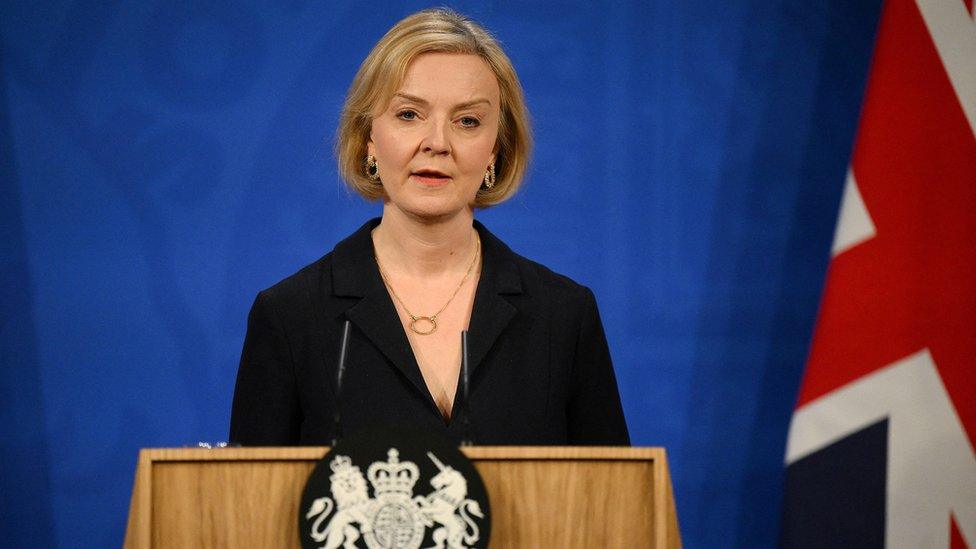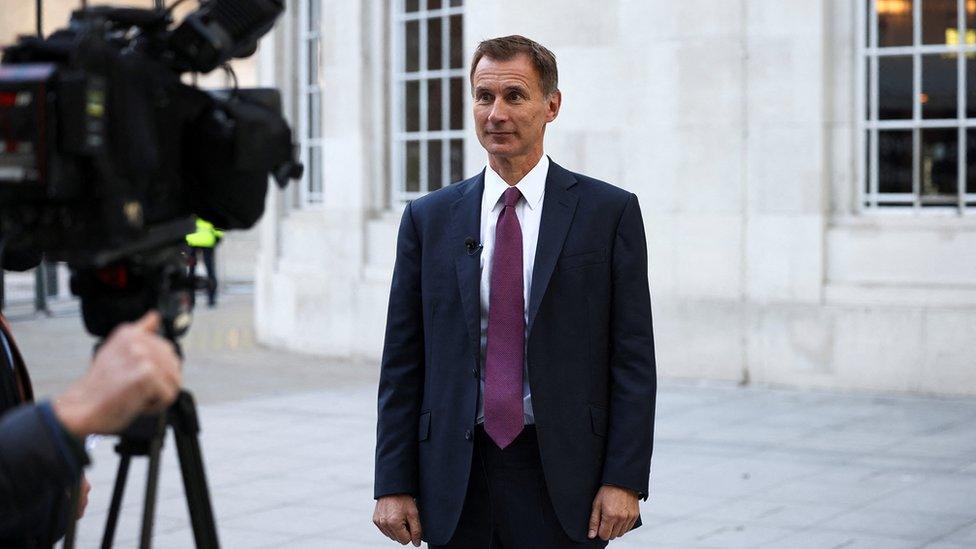Liz Truss versus The Markets
- Published

After humiliation at the hands of these markets, Liz Truss has little authority left, and in pushing her Growth Plan, she looks like a prisoner of her new chancellor, her cabinet and her backbenchers.
Jeremy Hunt is making it clear that this is not merely a U-turn on a botched "flying blind" mini-budget but a re-set of Britain's public finances, with a warning that it will hurt.
Holyrood has reason to look with alarm at the implications for spending, but Scottish ministers could also learn lessons about what happens to a nation state where the government sees few limits to how much it can borrow, or constraints on its visions of economic growth.
What drives "The Markets" to act as they do, and to blow governments off course? Do investors want political power, to undercut public spending, or merely a reliable return for their money?
Can a democracy be undermined by "The Markets"? The left has long thought so. The experience of Greece, during the Eurozone crisis, showed how it can happen - a democratic mandate blown off course because the markets don't think the government can sustain its borrowing.
That's not what was expected of a Conservative government in one of the world's largest economies with its own currency.
It may seem stranger still when that government sets out to cut top rate tax and let companies keep more of their profits, while removing restrictions on financiers' bonuses. How could "The Markets" wish to undermine that?
But that's what we've seen. From the left comes one observation that governments should protect us from markets, but with the humiliating dismantling of Liz Truss's experiment in unfunded tax-cutting, it has been markets that have protected us from the government.
So how can an entity which is impossible to locate, with no central neural function, and with a reputation for being skittish, herd-like, irrational and ethically challenged, force Downing Street to abandon its plans?
It has to do with risk and trust. Like an old-fashioned bank manager assessing you for a loan, those who take the individual decisions to buy a UK government bond have to make a judgement on whether the government that issued it is able to pay out interest each year and to repay the face value at the end of its term?
And by that time, might there be so many other bonds issued that it's significantly less likely that it can do so?
It is not just a question of whether Britain would default, which it has never done before. It is an investor's judgement of whether that bond will hold its value as debt grows.
So what are these investors looking for? A serious, stable government that knows what it's doing, that sets rules for controlling its annual deficits and debt, with a reasonable expectation that it has the discipline to stick to the plan. The mini-budget on 23 September offered none of that.
Economic competence
Investors can see that governments change course and break rules as they're buffeted by events. They'll often forgive that. They know other parties will win power and bring other priorities. Investors are not anti-democratic.
But their job is to safeguard money and earn from it, so they also make a judgement about how much that borrowing profile is likely to change with a new government. If one is turfed out by the voters, will the next one act responsibly?
That's why "The Market" is not just about numbers. The people in it are constantly making judgements about politics and about the people at the top of politics: about stability, reliability and competence, none of which can easily be measured or subjected to the mathematicians whom investment houses hire.

Their judgement of character can be as flawed as they are by any of us. But their assessment of Liz Truss and Trussonomics has been harsh.
Bond investors primary concern is with levels of borrowing, but do they care much about the balance of tax and spending? Do they, perhaps, harbour a preference for low tax with a limited state and public services?
You might well find that financiers are more likely to be both conservative about public finance and Conservative with their votes. But it's not necessarily the case that they want to see public services and the size of the state cut back.
For those who invest in company shares rather than bonds, there is a recognition that firms do well in a country with strong public services. They need the infrastructure to get their supplies in and their products to market, their data flowing rapidly and reliably, and to move their staff to and from work.
For a company that operates in Britain and the USA, their workforce is provided with relatively efficient, tax-funded health care in one country, while the payroll cost of private insurance in the other is a huge corporate burden. Corporate investors are attracted to countries with a strong and reasonably predictable rule of law.
They also want to see an economy that's geared for growth, and Liz Truss is not the only person who thinks that the UK needs to boost its growth rate. Where she differs from many others is in the belief that the starting point is lower tax.
Those others are more likely to identify low productivity as the vital and malfunctioning cog in the British economic machine. They argue that it is in adding value during an hour's or a day's honest toil that we earn greater prosperity, rather than stimulating demand and investment, while whizzing money round the economy at a faster rate.
Re-setting public finances
So with a background of rising interest rates internationally, and after three weeks of political and financial turmoil buffeting the British government, what did the markets perceive as Liz Truss junked her close ally as punishment for implementing the policies that won her the Tory leadership?
Enough to give her the thumbs down. Thursday's expectations of a U-turn rallied bond prices and the pound. But these positive moves were pared back when they saw, first, the limited extent of the announcement and - perhaps more important - the limited understanding that the prime minister seems to have of her weak position as she faced the cameras on Friday afternoon.
Asked why she wasn't exiting Downing Street as she had told Kwasi Kwarteng to do, her answers sounded like her continued presence in office is necessary to provide stability.
It's unlikely Jeremy Hunt, the new chancellor, will see things that way. If his job is to reassure markets, and it is, then he can dictate terms to his neighbour in Number 10.

Jeremy Hunt did a round of media interviews on Saturday morning
In interviews on Saturday morning, he did little to support the prime minister beyond repeating her appeal for stability. At the same time, he did a lot to shred her approach to public finances.
More taxes will have to rise, he said. Spending will be cut. Nothing is protected while he examines the books, including spending on the NHS. This was not just a U-turn on a botched mini-budget, but a re-set of Britain's public finances, with a warning that it will hurt.
Liz Truss looks like a prisoner of her new chancellor. With her authority in tatters, she is a prisoner of her cabinet, if they combine to stand up to her. She is a prisoner of her parliamentary party, in which MPs are reported to be deeply dismayed and unimpressed.
The PM can continue to push the larger part of the mini-budget's Growth Plan that remains, for now, intact.
But apart from tax, look what that involves: planning deregulation to allow housebuilding, fracking (also not in Scotland), de-regulation of worker rights and environmental protection - all of them vulnerable to backbench mutiny as well as external pushback. Does Liz Truss really have the authority to push these through against opposition?
Spending squeezed
And then there's spending. In her brief statement, she gave a few hints of where she's heading. One was: "We will do whatever is necessary to ensure debt is falling as a share of the economy in the medium term".
Whatever is necessary means either tax or spending or both have to fit with that borrowing constraint, and the prime minister will surely want to hang on to at least some of her tax cuts.
Second, she talked of delivering public services more efficiently. Who could argue with that? But it's been tried by every other prime minister, and if it doesn't mean cuts, then it certainly means a squeeze, and usually an uncomfortable one for those who depend on those services as well as public sector workers. The new chancellor, from his time as health secretary, has shown he is content to court unpopularity.
"Spending will grow less rapidly than previously planned": another hint from the prime minister of at least a squeeze, and amplified on Saturday by Jeremy Hunt.
This could come to Scots directly in welfare benefits and indirectly through the block grant to Holyrood, with limited ability for MSPs to use tax varying and welfare powers to mitigate the effects.
The Scottish government and SNP MSPs may also be watching closely and learning what happens to a country that lives beyond its means in the vague hope that the bond markets will sustain an uncontrolled level of deficit and rising debt at comparable interest rates to its neighbours, and in the equally vague hope that this will achieve faster growth with which to make anything and everything possible.
It may have a sobering effect this Monday as the Scottish government publishes its economic prospectus for independence.